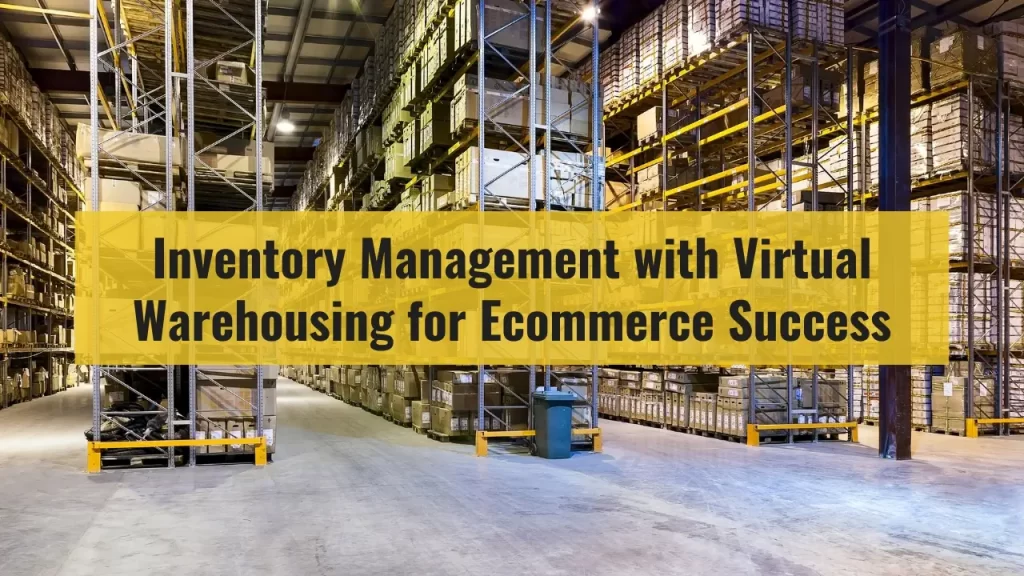In the fast-paced realm of ecommerce, the backbone of a thriving business lies in its ability to master the art of Inventory Management. As technology continues to evolve, traditional methods are giving way to innovative solutions, and at the forefront of this revolution is the advent of Virtual Warehousing.
The Traditional Struggles of Inventory Management
Running a successful ecommerce business comes with its unique set of challenges, and navigating the intricacies of inventory management has often proven to be a daunting task.
Conventional systems relying on manual processes, spreadsheets, and outdated software have become synonymous with inefficiencies, leading to a myriad of issues such as overstocking and stockouts.
Imagine the frustration of a customer eagerly placing an order, only to be informed later that the product is out of stock. Such scenarios not only result in immediate dissatisfaction but also pave the way for negative reviews and potential customer loss. On the flip side, overstocking ties up valuable capital, occupies precious warehouse space, and can lead to significant financial losses.
Enter Virtual Warehousing
Virtual Warehousing emerges as a game-changer, reshaping the landscape of inventory management. Unlike its traditional counterpart, virtual warehousing operates in the digital realm, leveraging advanced technologies to streamline and optimize the handling of stock.
The Benefits of Virtual Warehousing
1. Real-time Inventory Tracking
One of the hallmark advantages of virtual warehousing is the ability to track inventory in real-time. This translates to businesses having an up-to-the-minute overview of their stock levels, empowering them to make informed decisions promptly.
2. Reduced Errors and Stockouts
Automation inherent in virtual warehousing significantly reduces the likelihood of errors. This, in turn, minimizes the chances of stockouts, ensuring products are available precisely when customers demand them.
3. Optimized Order Fulfillment
Virtual warehousing facilitates faster and more accurate order fulfillment. When a customer places an order, the system swiftly identifies the nearest fulfillment center with the required product in stock, resulting in reduced shipping times and heightened customer satisfaction.
4. Cost-Efficiency
Traditional warehousing involves substantial operational costs, including rent, utilities, and maintenance. Virtual warehousing eliminates many of these costs, emerging as a more cost-efficient option, especially for businesses operating within tight budgets.
5. Scalability
As businesses expand, so does their inventory. Virtual warehousing seamlessly accommodates this growth without the need for physically expanding storage spaces. This ensures that businesses can adapt to changing demands without the constraints imposed by traditional storage limitations.
Embracing the Future of Inventory Management
The adoption of virtual warehousing represents a paradigm shift in the approach to inventory management for ecommerce businesses. Beyond being a technological upgrade, it signifies a strategic move toward ensuring long-term success and customer satisfaction.
User-Friendly Interfaces for Enhanced Experience
The adoption of virtual warehousing represents a paradigm shift in the approach to inventory management for ecommerce businesses. Beyond being a technological upgrade, it signifies a strategic move toward ensuring long-term success and customer satisfaction.
Integration with Ecommerce Platforms
Virtual warehousing platforms come equipped with user-friendly interfaces, enhancing the overall experience for businesses. These interfaces often provide insightful analytics and reporting tools, enabling businesses to make informed, data-driven decisions.
Emotional Connection with Customers
To further augment efficiency, virtual warehousing seamlessly integrates with various ecommerce platforms. This integration ensures that inventory levels automatically update across all sales channels, mitigating the risk of overselling and streamlining the overall sales process.
Overcoming Skepticism: Embracing Change for Success
While the benefits of virtual warehousing are evident, some businesses may still harbor skepticism about transitioning from traditional methods. Change can be daunting, but in the fast-evolving landscape of ecommerce, adaptation is key to survival.
Addressing Concerns
1. Data Security
Security concerns regarding data in a virtual environment are legitimate. However, virtual warehousing providers prioritize robust security measures, including encryption and secure authentication protocols, to safeguard sensitive information.
2. Training and Adaptation
The transition to virtual warehousing may necessitate training for the existing workforce. However, many providers offer comprehensive training programs to ensure a smooth transition and minimize disruptions to daily operations.
3. Return on Investment (ROI)
Businesses may question the return on investment associated with virtual warehousing. The cost savings, improved efficiency, and enhanced customer satisfaction quickly contribute to a positive ROI, justifying the initial investment.
The Future is Now: Embrace the Virtual Warehousing Revolution
In conclusion, the wonders of virtual warehousing are reshaping the ecommerce landscape. Businesses that embrace this revolution in Inventory Management position themselves not only for operational efficiency but also for enhanced customer satisfaction and sustainable growth.
The emotional connection forged between businesses and their customers through seamless order fulfillment contributes to a positive brand image. Virtual warehousing is not merely a technological upgrade; it represents a commitment to providing a superior customer experience and securing a competitive edge in the dynamic world of ecommerce.
As we gaze into the future, the message is clear: the time to embrace the wonders of virtual warehousing for ecommerce success is now. This transformative journey promises not only streamlined operations but also the creation of lasting relationships with customers who will remember the brand that consistently delivers on its promises.
